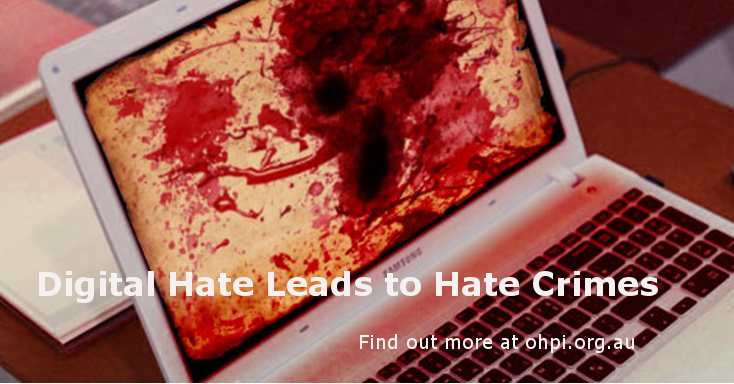We are seeing an unprecedented rising not just in hate speech but in hate crimes. Yesterday British MP Jo Cox was murdered, shot and stabbed by an assailant shouting “Britain First” the name of the far-right anti-Muslim British group created as a social media movement.
The attack on the pulse night club in Orlando last Sunday was the largest mass shooting in the United States. Pulse was a gay night club and FBI Special Agent Ron Hopper told the media it “was an act of violence borne out of hate that inflicted terror on an entire community… I would call it a hate crime, I would call it terrorism, it’s both.”
There are many other recent incidents of violence and threats of violence against politicians, anti-hate activists and members of the public seeking to stand up against online abuse. There are even more examples of hate speech in social media posted anonymously and increasingly by people under their real names.
Dr Andre Oboler, CEO of the Online Hate Prevention Institute explains, “Social media has allowed hate speech to thrive. It has allowed it go viral. Most worryingly, it has allowed hate speech to become normalized within society. This has been my fear since I first raised concerns internally about the potential dangers of hate speech in social media back in 2008. Since then social media has grown phenomenally, as has the danger it poses to society when its more destructive uses are not curbed.”
Social media has changed the way we need to think about the balance between freedom of expression on the one hand and on the other both the protection of human dignity and the protection of the public good of an inclusive society.
There is a growing lack of personal responsibility taken by those who put their ideas into the public arena. This is in part a result of a lack of consequences over hate speech posted in social media. Dr Oboler explains, “There is a reasonable chance that hate speech will not be removed when it is reported to the platform providers. Even if it is removed, it has already had its moment in the sun. There is very seldom any real consequence to the person who posts it. This leads to a breakdown of the fabric of society. It is essentially a breakdown of the rule of law.”
The European Commission took steps to correct this last month when they reached an agreement with Facebook, YouTube, Twitter and Microsoft on new efforts to remove illegal hate speech in the EU. The online backlash we documented shows how some people, mostly using fake accounts, have found the online world the perfect place to harass and bully others and object to an end being called to their “fun”. We need to recognize that some of the voices apposing efforts against hate speech are doing so purely because they like being free to bully others.
There has also been a failure to appreciate that social media is different from other means of communication. It operates at a far larger scale with many more voices. It allows things to go viral. It allows ideas, including incitement, to be seen and to influence people who are not visibly engaged in the discussion. Having incitement to hate or incitement to violence in public online spaces where they can be seen by an unknown number of people and have the ability to go viral is simply dangerous. It can lead to radicalization and lone wolf terror attacks, hate crimes or both. Removing that content is the only reasonable approach to reduce the risk of it causing harm.
The Online Hate Prevention Institute is an Australian Harm Prevention Charity. Our core purpose is to prevent harm to people as a result of hate speech and incitement in social media. We are four years old the problem we were created to tackle has grown immensely in that time. We have been recognized by UNESCO as one of only hand handful of organisations across the globe doing innovative work in this area. With the deteriorating climate of political discussion online, the rise of online hate groups which are now having a real world impact and the rise in internet fueled violent extremism the need to support this work is greater than effort. Unfortunately, we are yet to receive any commitment of serious ongoing government funding and while our calls for donations are shared hundreds of times in social media, very few people take the added step of actually making a donation, even a small one, themselves. As individuals and as a society we are slowly waking up to the problem, but we have yet to seriously commit, individually or collectively, to creating change. Those of us who have spent years working in this space cannot do it alone and without support, not when the level of hate and the consequences just keep rising.
Please help share this briefing:

